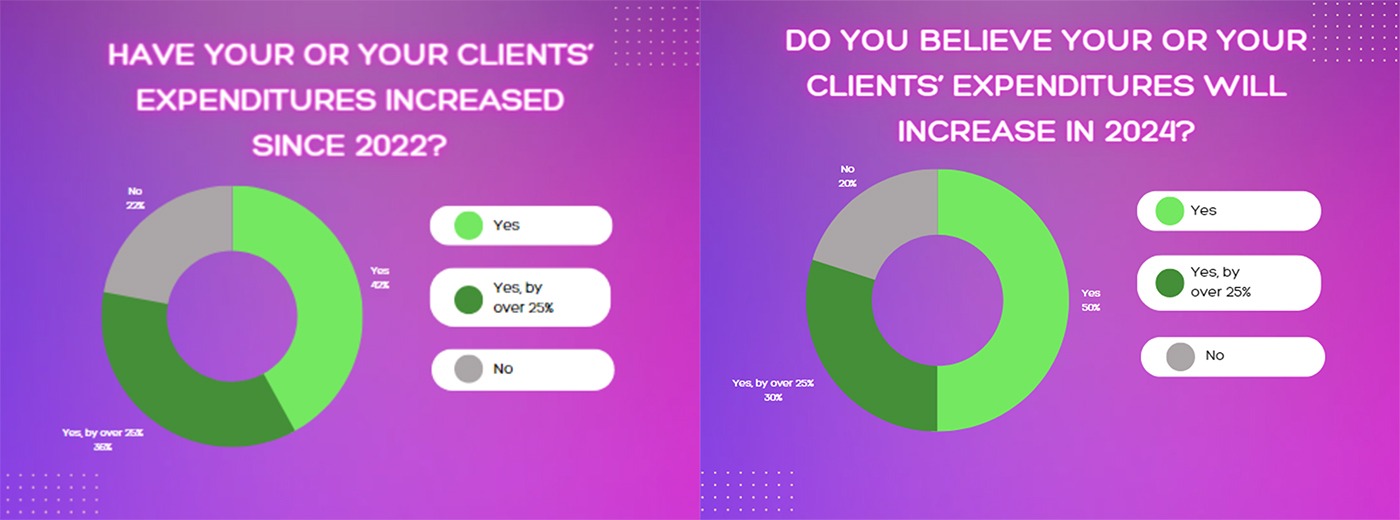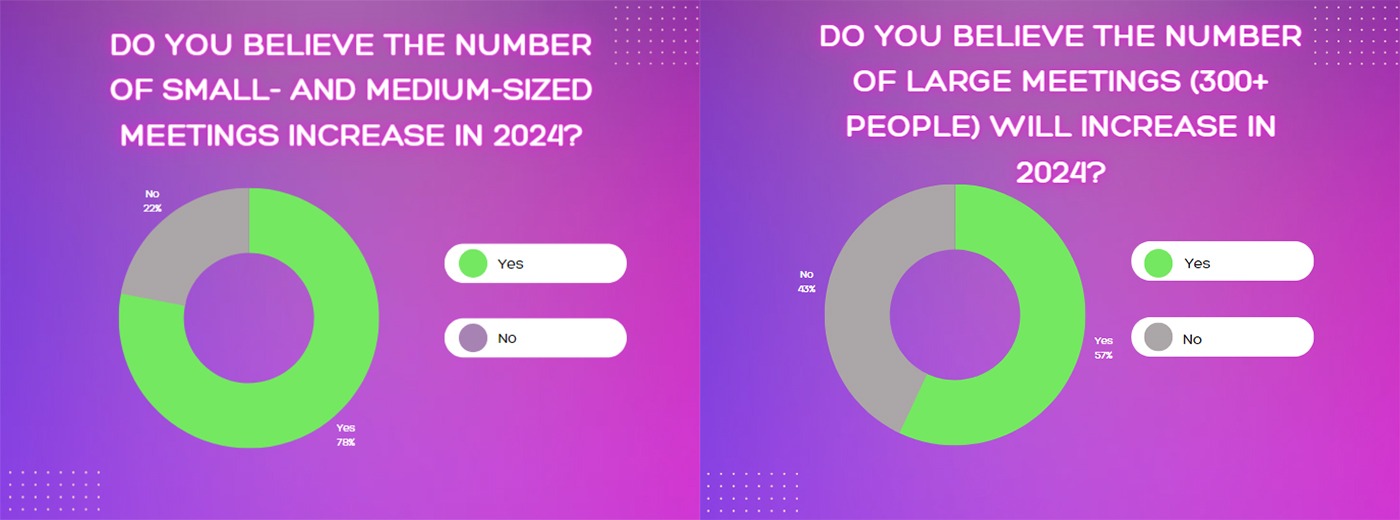Accor Survey: “Meeting Expectations: The Future of Meetings & Events”
World-leading hospitality group Accor operates a diverse hospitality group of over 40 hotel brands, from luxury to economy. They offer experiences in over 110 countries with 5,500 properties, 10,000 food and beverage venues, wellness facilities and workspaces.
Recently, the Accor survey titled, “Meeting Expectations: The Future of Meetings & Events” polled members of the meetings and events industry in a diverse array of roles. They aimed to assess the industry’s transformation over recent years and analyze major shifts in its evolution.
The conclusions evoked a need to focus on balance and belonging in order to drive the industry’s strategic growth through 2024 and beyond, as well as to comprehensively recover from the effects of the Covid-19 pandemic.
Breaking Down the Accor Survey Results
The results showed an overwhelmingly positive outlook for the industry.
Seventy-eight percent of respondents say that their or their clients’ expenditures have increased since 2022. Over one-third of respondents report increases of over 25%, and 80% of respondents expect further spending increases in 2024. Of that 80% group, 30% agree spending would again rise by over 25%.

These results can dissuade fears that the industry may struggle to thrive following the pandemic. In fact, the industry’s audience is expected to surpass even 2019 levels in the coming years. Sophie Hulgard, Chief Sales Officer at Accor, says, “The total global meetings industry worldwide is forecast to be worth $1.78 billion by 2030.”
At a rate of 78%, respondents agree that the number of both small and medium-sized meetings (50-100 delegates), as well as meetings of over 100 delegates, would increase in 2024. At 57%, over half of the respondents surveyed also expect a rise in the number of meetings hosting over 300 delegates.

This growth brings both ample opportunities and new challenges as planners work to accommodate an influx of attendees while booking, planning and executing events.
Respondents also confirm the importance of trade shows, exhibitions and conferences. Seventy-eight percent agree that attendance at these events is important for their industry.
The Accor survey found that face-to-face meetings continue to prove invaluable. Thirty-three percent of respondents report seeing 40% more revenue generated from in-person meetings and events versus virtual events. 80% state that they would be unhappy closing deals via video conference in 2024.
Read More: Answering the Call of the Event Future
The Big Lessons: Five Trends
“The pandemic was a defining moment for the industry. We were thrust into a world of virtual gatherings, with in-person events grinding to a halt. Yet, we adapted and evolved,” says Hulgard. “That evolution continues today and the one thread that connects all the trends we forecast is the human connection. Today, more than ever, it is about the human need to meet, share and thrive.”
The Accor survey report highlighted five major trends expected to be leading factors in the industry’s continuing evolution.
Softer Productivity
In recent years, wellness has become the star of the show. Beyond integrating more nourishing food and well-being activities, events reflect a growing awareness of participants’ needs for rest. It’s important to curate schedules to work in more flexibility and downtime to allow participants to avoid burnout and have enough energy to actively engage with their meetings and activities when it’s most important.
They’ve termed this concept Softer Productivity.
 “Nobody wants to be pushed to their limits anymore,” says Meenaz Diamond, Senior Vice President of Meetings and Events at Accor. “There is a space for a much softer productivity that still allows you to deliver, but to do it in your own time and in your own way.”
“Nobody wants to be pushed to their limits anymore,” says Meenaz Diamond, Senior Vice President of Meetings and Events at Accor. “There is a space for a much softer productivity that still allows you to deliver, but to do it in your own time and in your own way.”
In the report, Accor suggested that it is beneficial to work in active breaks, such as a stretching session in between discussions. Providing healthy menus and catering to dietary preferences is essential. Wellness lounges or refreshment stations, along with team building activities like outdoor adventures or cooking classes, do wonders to make a meeting more enjoyable and refreshing. Technology solutions like wellness apps or gamification elements can help attendees stay aware of their wellness at a meeting.
Selling Belonging
Despite the success of virtual events through the pandemic, people recognize that the quality of connection they make face-to-face with others is unmatched. Along with a quantifiable ROI, companies seek an ROX—Return On Experience. Selling Belonging is all about creating quality human connections.
Diversity, equity and inclusion (DEI) is essential. Participants of all backgrounds have a right to feel safe and supported in sharing their ideas. This contributes to a more collaborative and productive meeting environment. Planners should get familiar with cultural, economic and social differences amongst a diverse group of attendees and assess how to facilitate the process of sharing ideas to be the most productive.
Read More: What Meeting Profs Get Wrong About DEI—and How to Start Fixing It
Designing Experiences
Close in line with ROX is Designing Experiences. Planners are reimagining how they can structure events and deliver content in memorable spaces. Events that take place beyond meeting rooms, such as in venues that provide immersive experiences, help to make ideas stick and encourage more creative ways of thinking.
Kishan Chandnani, Global Senior Vice President of Premium Brands at Accor, says “The MICE customer of tomorrow is looking for an experience-led but also purpose-driven brand, a brand that cares about the needs of the individual and the community.”
Montreal-based creative studio C2 found from their own survey that 71% of attendees expect some form of personalization. Utilize natural light or strategic artificial light; incorporate plant life—the UK Green Buildings Council found that office workers who work in spaces with plants are 15% more productive on average. Transform a ballroom into breakout spaces and allow people to mill about freely and challenge expectations of what a large event can look like.
Green Gatherings
 Sustainability is at the front of both planners’ and attendees’ minds, as Green Gatherings takes center stage. People are concerned about the carbon impact of the events they plan and attend. Recycling, limiting food waste and managing temperature in eco-friendly ways make positive impacts. Sustainability isn’t only about reducing emissions. It also means meaningfully engaging with local communities, raising attendees’ awareness of local culture and not harming—and actively working to preserve—local ecosystems.
Sustainability is at the front of both planners’ and attendees’ minds, as Green Gatherings takes center stage. People are concerned about the carbon impact of the events they plan and attend. Recycling, limiting food waste and managing temperature in eco-friendly ways make positive impacts. Sustainability isn’t only about reducing emissions. It also means meaningfully engaging with local communities, raising attendees’ awareness of local culture and not harming—and actively working to preserve—local ecosystems.
Global market research company Ipsos conducted a survey that found 81% of European and 74% of American travelers would consciously avoid activities they knew to be not socially responsible; in addition, a respective 77% and 68% would choose an accommodation with a green certificate over one without. Accor aims to reduce its own carbon emissions by 46% by 2030, and 5,500 Accor hotels have earned or are currently earning an external sustainability certification.
Read More: Seeking Sustainable Venues
Disruptive Technology
The Accor survey sees wave after wave of all kinds of Disruptive Technology. AI transforms the way planners can design events. Planners can use AI to crunch data and produce relevant analyses at rapid speed. This saves time and helps them to design events tailored to attendees’ needs. For example, how do we design a schedule that benefits each participant’s availability? Planners can use AI to rapidly assess all the participants’ schedules and reveal the most strategic times to hold a talk or a seminar that most people, if not everyone, can attend. As we continue to learn to use AI, the possibilities available expand exponentially.
Virtual reality is on the rise as well, offering a whole new world to event planners. Bloomberg anticipates that the metaverse market may reach $783.3 billion in 2024.
Read More: How Meeting Profs Can Find the Right Event Tech
Full Steam Ahead!
The Accor survey concludes that the trends we are familiar with continue to rise. Planners and attendees are engaged with changes to increase wellness and sustainability. Planners can use event design and AI in their efforts to create memorable experiences and people are enthusiastic about the return to face-to-face meetings. The revenue generated from these in-person events and meetings has already risen and is expected to continue to.
The future of the meetings and events industry is bright. These trends reveal how planners can tailor their events to change with the times and be as successful as ever in terms of both ROI and attendee satisfaction.




